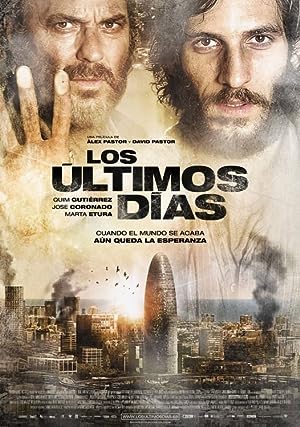The Last Days, Los Ultimos Dias, is a surprisingly upbeat, Spanish apocalyptic movie about a worldwide phenomenon that only affects human beings and prevents them from functioning normally. There are two parallel stories in the past and the present focusing on a computer engineer’s personal and professional life. As the past and present converge, the nostalgia for better times gives way to a frustration that he was not a better, more appreciative man in the past which motivates him to act courageously now. He forges an uneasy alliance with The Terminator, Enrique, the office hatchet man who fires people, in their quest to reunite with their loved ones in this changed landscape. The Pastor Brothers definitely redeemed themselves after their middling first apocalyptic film, Carriers.
Like most apocalyptic movies, The Last Days’ goal is to reunite loved ones and form a family. The main character’s apprehension of fatherhood and crisis of manhood as a provider may be a given in this genre and parallels the global psychological crisis rooted in fear, but it is depicted in such an organic way that I didn’t mind the predictability. The uneasy alliance with a more interesting character heightened an already existing tension because Enrique was killing it in and outside of the office. He also clearly watched movies, particularly Pathfinder, and was ready for the apocalypse. There was always this suspicion that Enrique would turn on the main character because he was ruthless, but because he was so effective, you are rooting for him anyway and hoping that they can work it out. Enrique provides enough mystery and badassery that he is a perfect foil and mentor for the main character’s every man archetype. Jose Coronado definitely made a strong first impression on me.
While The Last Days seems to initially have a similar vibe to The Belko Experiment, it definitely has more heart and humanizes the situation, and the professional world soon takes a backseat to the personal. Whenever things are about to devolve into mayhem, there is always a kernel of hope in the situation. While I’m not thrilled at the number of characters who have to die to help the main character to step up to the plate or eliminate another obstacle, past or present, in his attempts to reunite with his family in the past or the present, I’ll sign a waiver because it is always done in an unexpected way. Just when you overcome one challenge, an abrupt threat succeeds.
The most interesting lesson in The Last Days is how fatherhood is supposed to ameliorate the effects of toxic masculinity. There is one confrontation that gets defused by the presence of a child. While I don’t share the filmmakers’ optimism since people do horrific things in front of children all the time, the scene still resonates as suspicions quickly give way to recognition of shared needs and a capacity for love. Conventional ideas of property and belonging evaporate with the more eternal concepts of home is where the heart is. It also felt as if there was an implicit sympathy for seeing immigrants as people and a silent rebuke of viewers for assuming the worst upon first meeting that family. Shots of people eating pigeons and rats are silent visual reminders that but for the grace of God can you enjoy a better station in life than those looking for comfort under your roof. Anyone can become a refugee.
The Last Days’ vision of an apocalypse was unexpected and inventive. It was like the tv series Life After People, but while people still exist. This movie definitely beat The Mist in imagining life and death confrontations in supermarkets, but fell just short of capturing the dread of a mall as George Romero’s Dawn of the Dead did. I really appreciated that when it looked to other countries, it focused on Canada, not the US. It was a relief that it was set in Barcelona, not NYC. We need a break.
While The Last Days began to flounder when it mined for a deeper meaning behind the crisis, man’s harmony with nature, it more than made up for it by combining an emotionally rich tapestry in an I Am Legend environment. I didn’t anticipate the final scenes, but I’m only human, and I was moved. I don’t care how cheesy and unrealistic it was. It was still beautiful. The best scene is when a screensaver transitions into real stars. Even if the movie fails at verbally capturing the point, it evokes that point emotionally and shares common ground with Leave No Trace. Really creating community and connecting with other human beings is more difficult with the trappings of civilization acting as a barrier to what is really essential to survival: love.
Even with the subtitles, I would highly recommend The Last Days. Spanish filmmakers come from a rich artistic tradition that balances high art with popular culture, joy in sorrow, the beauty of inevitable loss of parents watching their children grow beyond their capability of caring for them. From the evocative imagery of a rough communion in the ruins of an abandoned church to the gradual extinguishing of artificial light on the city’s skyline, this movie is a gorgeous exploration of how an apocalypse can strengthen the human spirit even as civilization falls. I’m even willing to sign a waiver on one technical, glaring error and did not think too much about the actual logistics of surviving in such a scenario.





